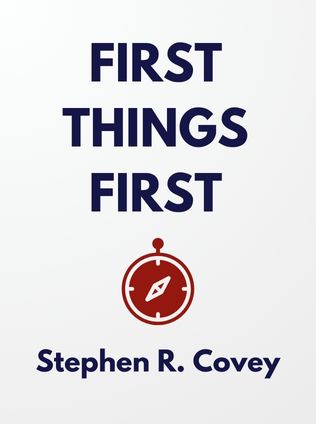
First Things First
By Stephen R. Covey
Published 09/1993
About the Author
Stephen R. Covey was a world-renowned leadership authority, organizational consultant, and best-selling author. His influential work, The 7 Habits of Highly Effective People, established him as a leading voice in personal and professional development. Covey’s teachings revolve around principles of character, ethics, and effective living, which have impacted millions of people worldwide. In First Things First, Covey, along with co-authors A. Roger Merrill and Rebecca R. Merrill, expands on his previous work by introducing a time management approach that prioritizes what is truly important in life.
Covey’s philosophy is deeply rooted in the idea of living according to timeless principles, rather than simply reacting to circumstances. His work has empowered individuals and organizations to achieve sustainable success by aligning their actions with their values. First Things First is a continuation of his commitment to helping people live with integrity, balance, and effectiveness.
Main Idea
The central theme of First Things First is that true effectiveness in life comes not from managing time more efficiently, but from prioritizing the things that matter most. Covey introduces a time management approach based on the concept of "first things," which refers to tasks and activities that align with your deepest values and long-term goals. By focusing on these priorities, you can achieve a more meaningful and fulfilling life, rather than simply getting more things done.
Covey emphasizes the importance of spending time on activities that are significant but not urgent—what he refers to as Zone 2 activities. These are the tasks that contribute to your long-term vision and personal mission, such as relationship building, self-care, and planning. By shifting your focus from urgent but less important tasks to significant activities, you can create a life that reflects your true priorities and aspirations.
Table of Contents
- Introduction: The Time Management Dilemma
- The Significance vs. Pressure Graph
- Shift to a Significance-Based Approach
- Understanding Your Essential Needs
- The Power of Universal Principles
- The Four Human Gifts
- Zone 2 Scheduling: A New Approach to Time Management
- Step 1: Identify Your Long-Term Vision and Personal Mission
- Step 2: Identify Your Roles
- Step 3: Set Zone 2 Goals for Each Role
- Step 4: Schedule Your Zone 2 Goals Each Week
- Step 5: Tackle Each Day Within the Context of Your Weekly Goals
- Step 6: Review and Learn From Your Week
- Finding Win-Win Solutions
- Creating Shared Responsibility Agreements
- Conclusion: Listening to Your Conscience
Introduction: The Time Management Dilemma
In the introduction to First Things First, Stephen Covey addresses the widespread struggle people face with managing their time effectively. He challenges the conventional wisdom that time management is about getting more things done in less time. Instead, Covey argues that true effectiveness comes from focusing on what really matters—your "first things." This shift in perspective is critical for achieving a balanced and fulfilling life.
Sign up for FREE and get access to 1,400+ books summaries.
You May Also Like
The Subtle Art of Not Giving a F*ck
A Counterintuitive Approach to Living a Good Life
By Mark MansonRich Dad Poor Dad
What the Rich Teach Their Kids About Money - That the Poor and Middle Class Do Not!
By Robert T. KiyosakiHow To Win Friends and Influence People
The All-Time Classic Manual Of People Skills
By Dale CarnegieQuiet: The Power of Introverts
The Power of Introverts in a World That Can't Stop Talking
By Susan Cain



















